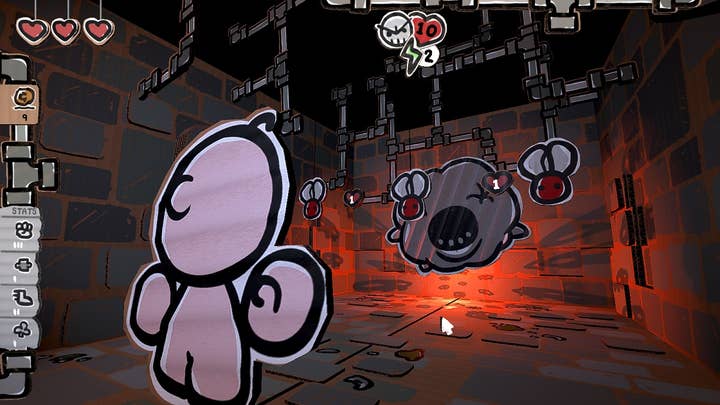The beauty of the indie spin-off
Binding of Isaac developer Edmund McMillen explains how and why he followed up the action game with a deckbuilding puzzle prequel
Brands tend to be seen as the realm of large publishers and developers, but successful indies are increasingly seeing opportunities to turn one-off hits into franchises. Edmund McMillen is one such developer.
The Binding of Isaac designer has already revisited his 2011 roguelike action game multiple times with a series of expansions, and now he's followed that up with a prequel, The Legend of Bum-bo. Released on PC this week, Bum-bo is not the action-focused dungeon crawler that Isaac is, but a puzzle-based deck-building roguelike. It's not the only time McMillen has been involved in a departure for a known game; before he split from Team Meat three years ago, the group had announced Super Meat Boy Forever, a mobile endless runner follow-up to the original Super Meat Boy.
The big-budget end of the industry has long had to carefully manage genre switches of this sort, such as when Capcom turned Resident Evil from its original survival horror template into a more action-oriented game centered around gunplay, when Sega announced Yakuza 7 would switch to turn-based combat, or when Blizzard announced it was working on a mobile Diablo game. Speaking with GamesIndustry.biz, McMillen acknowledges some fans don't appreciate it when developers play with the formula.
"I've found that once people see that the games can stand on their own and get a chance to experience them, their opinion tends to change"
"There is always a bit of a push when I announce something from a popular IP of mine that is new or different," McMillen says. "People always knee jerk and say, 'I like it how it was! This isn't like the original!' But I've found that once people see that the games can stand on their own and get a chance to experience them, their opinion tends to change."
McMillen says he enjoys working on spin-offs "because they allow for familiar yet new ways to explore stuff that you know people are already into."
"With Bum-bo I did run the risk of upsetting fans by making a game that didn't play at all like the original," he adds. "But I think there is still enough there that's familiar for people to grab onto and see it as a true prequel to the Isaac franchise."
As for what's different, McMillen says one huge difference is that Bum-bo is at its heart a puzzle game. The roguelike aspect of the game meant luck could still play a part in the outcome, but it had to take a backseat to player strategy.

"Where Isaac is full random, Bum-bo is smart random," McMillen says. "We look at what the player has and make sure we don't screw them over with what we are offering them. There is luck in the random tiles still, but the game wants you to be rewarded for strategic planning. So it's all less [random number generator]-based than Isaac. "
As an established indie developer with hits like Super Meat Boy and Binding of Isaac to his name, McMillen's experience with the challenge of discoverability is doubtlessly different from most small creators. Still, the issue has not escaped his attention.
"Well there are literally [tens of thousands] more devs now," McMillen says. "So yeah, it's a lot harder to get noticed. I've heard each day over 30 games are released on Steam, and an average Steam game sells 1,000 units due to how many are on Steam now. That's harsh, but I still think that games that have something new to offer will always get noticed. You look at the popular games that have come out recently and they are all oddball, leftfield-type games no one would have expected. I think that shows what people want and what stands out: something new and fresh."
McMillen may be partly responsible for some of those developers rushing into the market. He was prominently featured in the 2012 documentary Indie Game: The Movie, which focused on three games: Super Meat Boy, Braid, and Fez. Developers we've spoken to have often cited it as an influential film, though there's some disagreement on whether its net impact has been positive (inspiring creators to follow their dreams) or negative (glamorizing harmful behavior common in indie development and giving a skewed view of outcomes by focusing only on commercial and critical hits).
"I still think they made an amazing movie," McMillen says, but the endorsement is not unqualified.
"When people come up to me saying 'I have a wife and kid, but I just quit my job at EA after seeing the movie and I'm working on my first indie game!' I always feel like I need to scream, 'No, stop!' at them. I think a lot of the struggle is missed in the movie when it comes to how long most of us worked in the industry before even getting the chance to make a console game. I worked on games for ten years before Super Meat Boy released and I didn't make jack before it, even though I had made many award-winning and high-reviewed games before it.
"You never know what can happen, but sometimes I wish the movie had a disclaimer that said 'Warning: You must make ten-plus small games and work in the industry for ten-plus years before you will make a living off your work' -- just so people really understood the chance of just jumping in now and rolling the dice."









